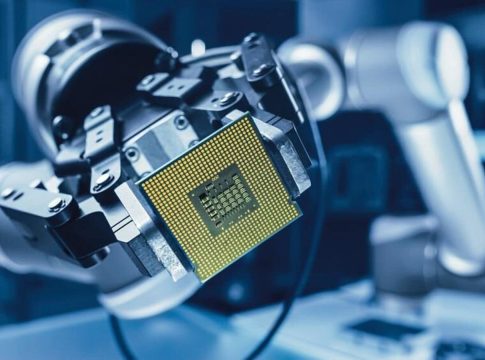The Future of Semiconductor Technology: Intel’s Roadmap to the Angstrom Era
At the recent Intel Foundry Direct Connect summit, the tech giant unveiled its ambitious roadmap aimed at taking on industry leaders TSMC and Samsung in the race for semiconductor innovation. With a target year of 2027, Intel’s focus shifts toward the ultra-advanced chip technologies that promise to redefine consumer electronics.
A Leap from Nanometers to Angstroms
For years, chip advancements have been measured in nanometers, referring to the size of transistors—the tiny switches that govern processing power. However, we are now in the midst of a notable shift to the "Angstrom" (Å) scale, wherein 1 nanometer equals 10 Angstroms. This transition underscores a significant move in miniaturization, which is crucial for packing more transistors onto a single chip and, in turn, boosting processing power dramatically.
What This Means for Consumers
Imagine smartphones launching apps at lightning speed, laptops that handle complex tasks without lag, and gaming consoles that produce breathtaking graphics. This ramped-up performance translates to smarter devices that enhance user experience. For instance, Microsoft’s recent Surface Pro 11 offers AI-powered features, providing seamless creativity and productivity in a sleek design.
Beyond Moore’s Law: Redefining Chip Architecture
Historically, Moore’s Law predicted that the number of transistors on a microchip would double roughly every two years, promoting rapid performance growth. Yet, as physical limitations loom large, the semiconductor industry is pivoting. Companies like Intel are now reevaluating chip architecture, focusing on inventive methods such as advanced packaging.
Chiplets and 3D Stacking
Techniques involving chiplets—specialized dies with distinct functions—and 3D stacking, where multiple chips are layered and interconnected, are emerging as game-changers. These methods allow manufacturers to integrate different functionalities more efficiently, leading to devices that are not just powerful but also compact and feature-rich. For example, Intel’s latest Arrow Lake processor showcases remarkable advancements in AI performance and power management.
Innovation Through Design
According to Ben Bajarin, an industry analyst, the semiconductor landscape is evolving into a phase characterized not by cramming more transistors into a single chip but by intelligently integrating smaller specialized components. Intel’s introduction of Turbo Cells in its 14A technology exemplifies this new focus, allowing for bursts of performance when tackling demanding tasks, while efficiency is maintained during lighter operations.
Transformative Consumer Experiences Ahead
The advancements in semiconductor technology are laying the groundwork for a future where your everyday devices will become smarter, faster, and more responsive. Key impacts include:
- Extended Battery Life: New power management technologies will prolong device usage between charges.
- Enhanced Performance: Faster processing speeds will make apps and software feel more responsive.
- Superior Graphics: Gaming and AR/VR gear will deliver breathtaking visuals with reduced lag.
- Advanced AI Capabilities: Devices will manage complex AI tasks more efficiently and with greater privacy.
- Sleek Designs: Smaller chips mean thinner, lighter devices without sacrificing functionality.
The Bottom Line
The semiconductor industry is in a transformative period marked by the transition to Angstrom measurements and innovative chip designs. As these technologies come to fruition, consumers can expect a dramatic enhancement in their devices—making everyday tasks easier and enriching their digital experience. With Intel currently leading this charge, the future promises a world of smarter, more efficient technology at our fingertips.
Stay tuned for the latest updates in tech innovation, and prepare for a smarter tomorrow!

Writes about personal finance, side hustles, gadgets, and tech innovation.
Bio: Priya specializes in making complex financial and tech topics easy to digest, with experience in fintech and consumer reviews.

